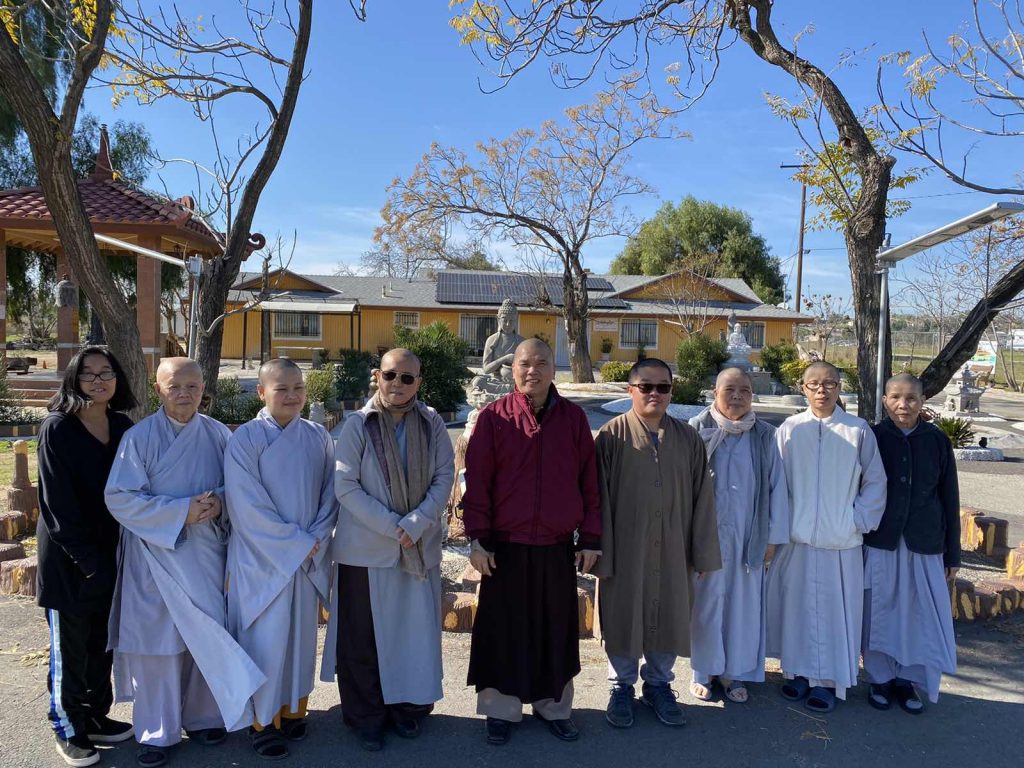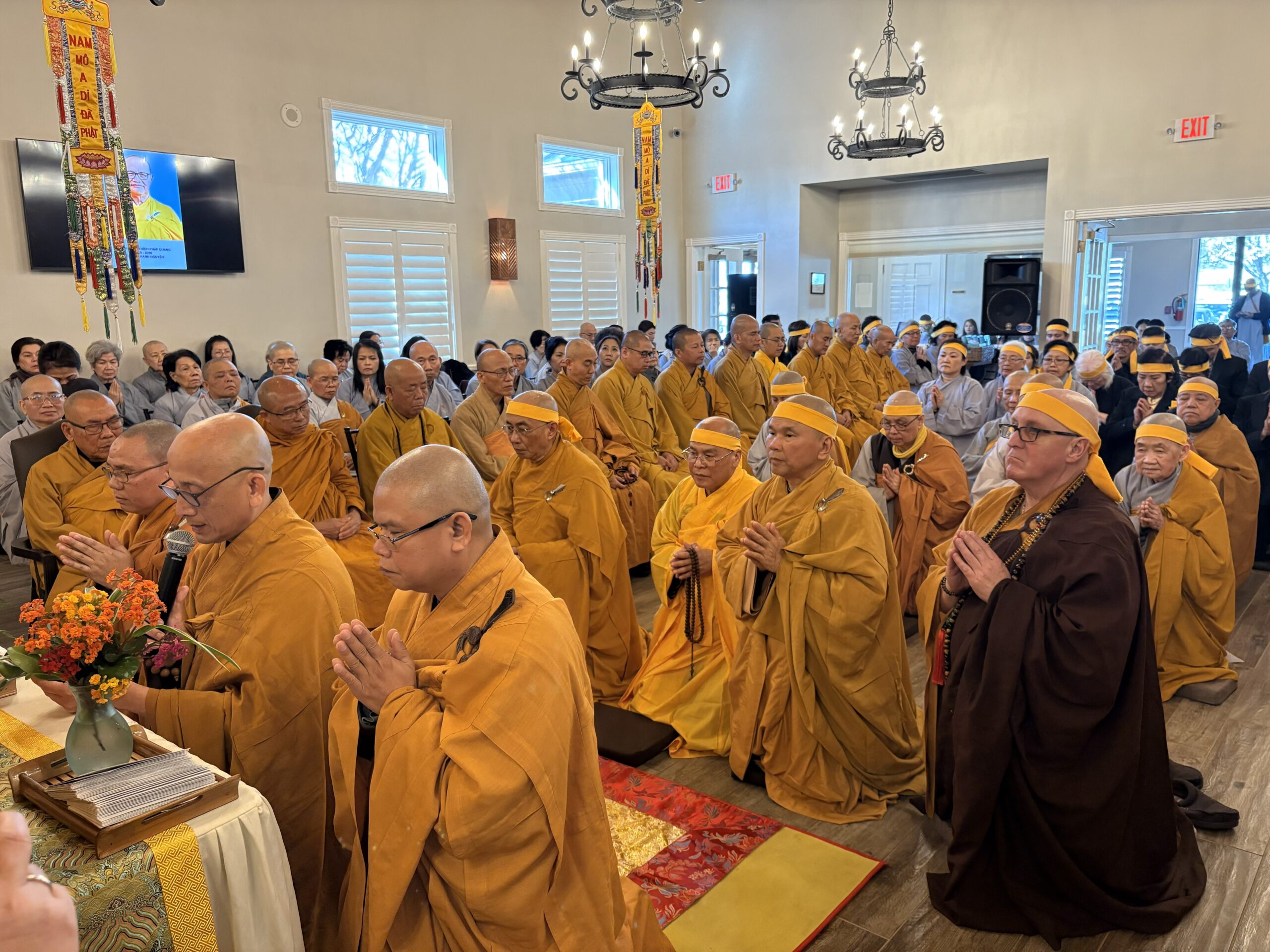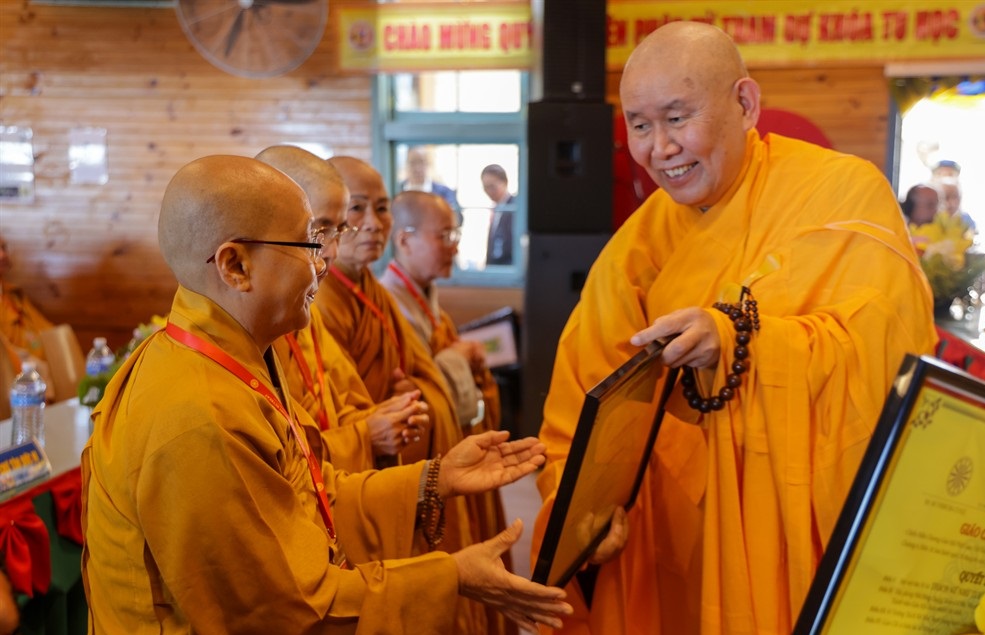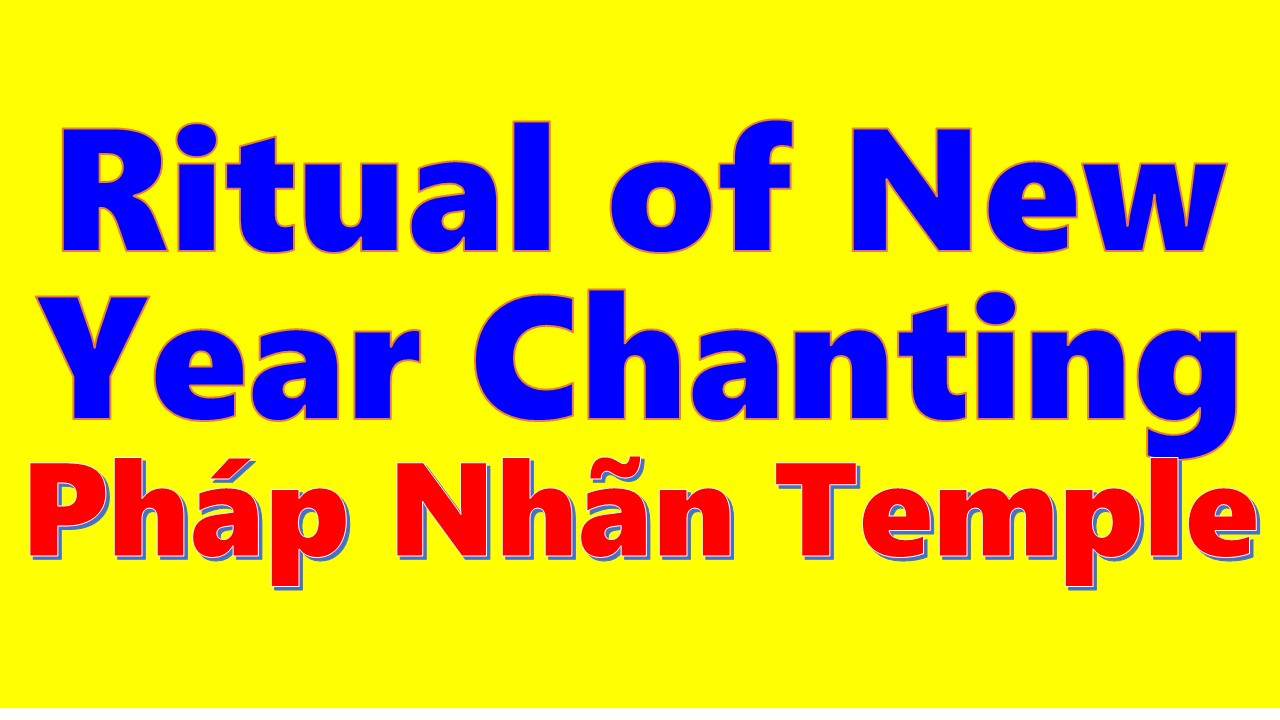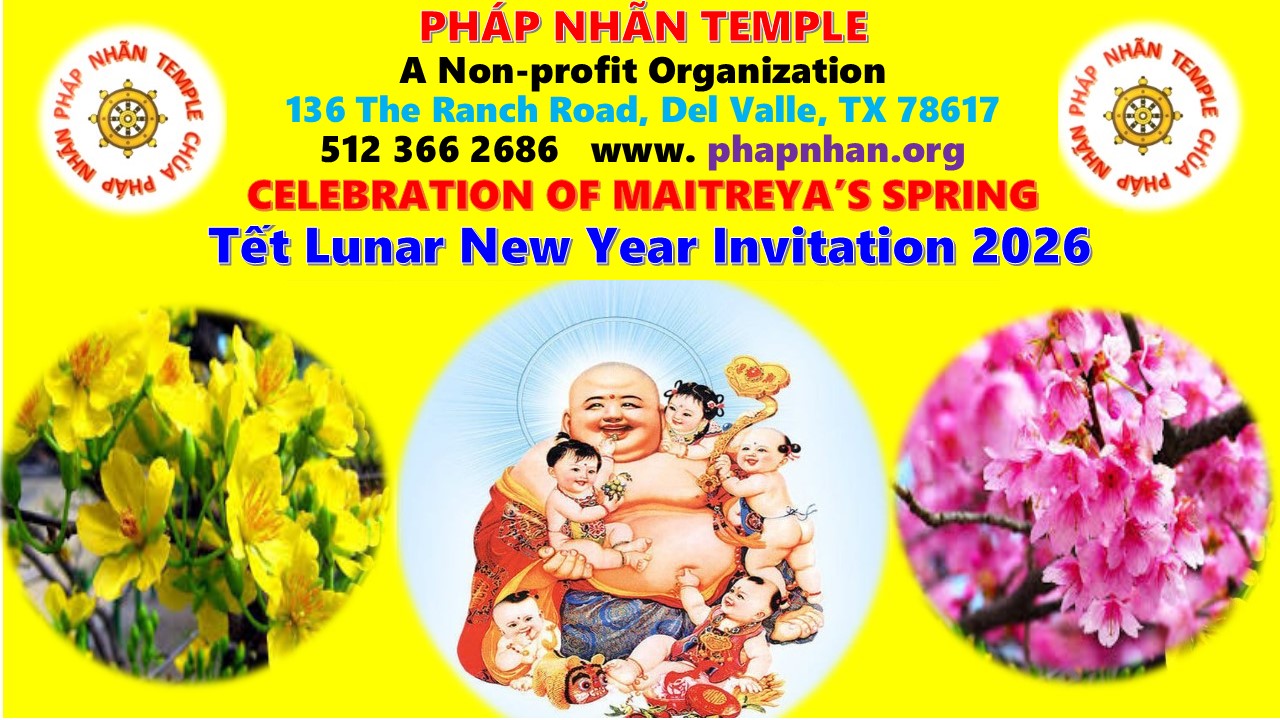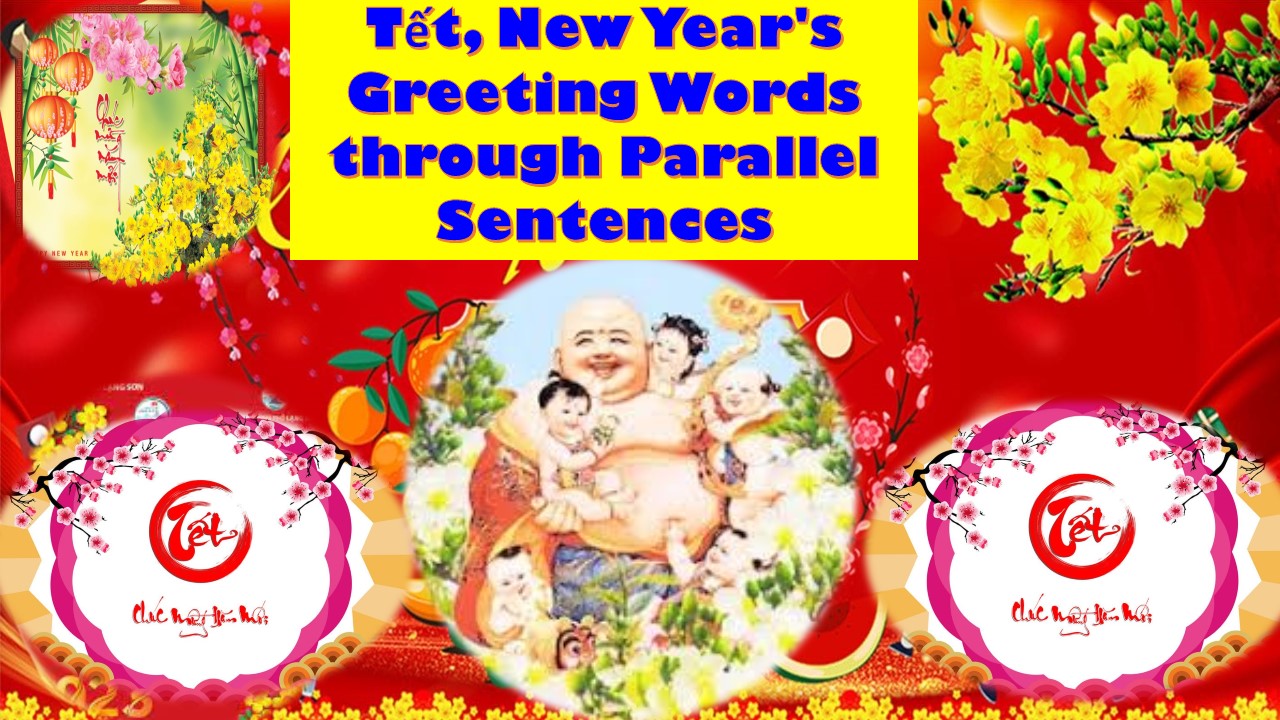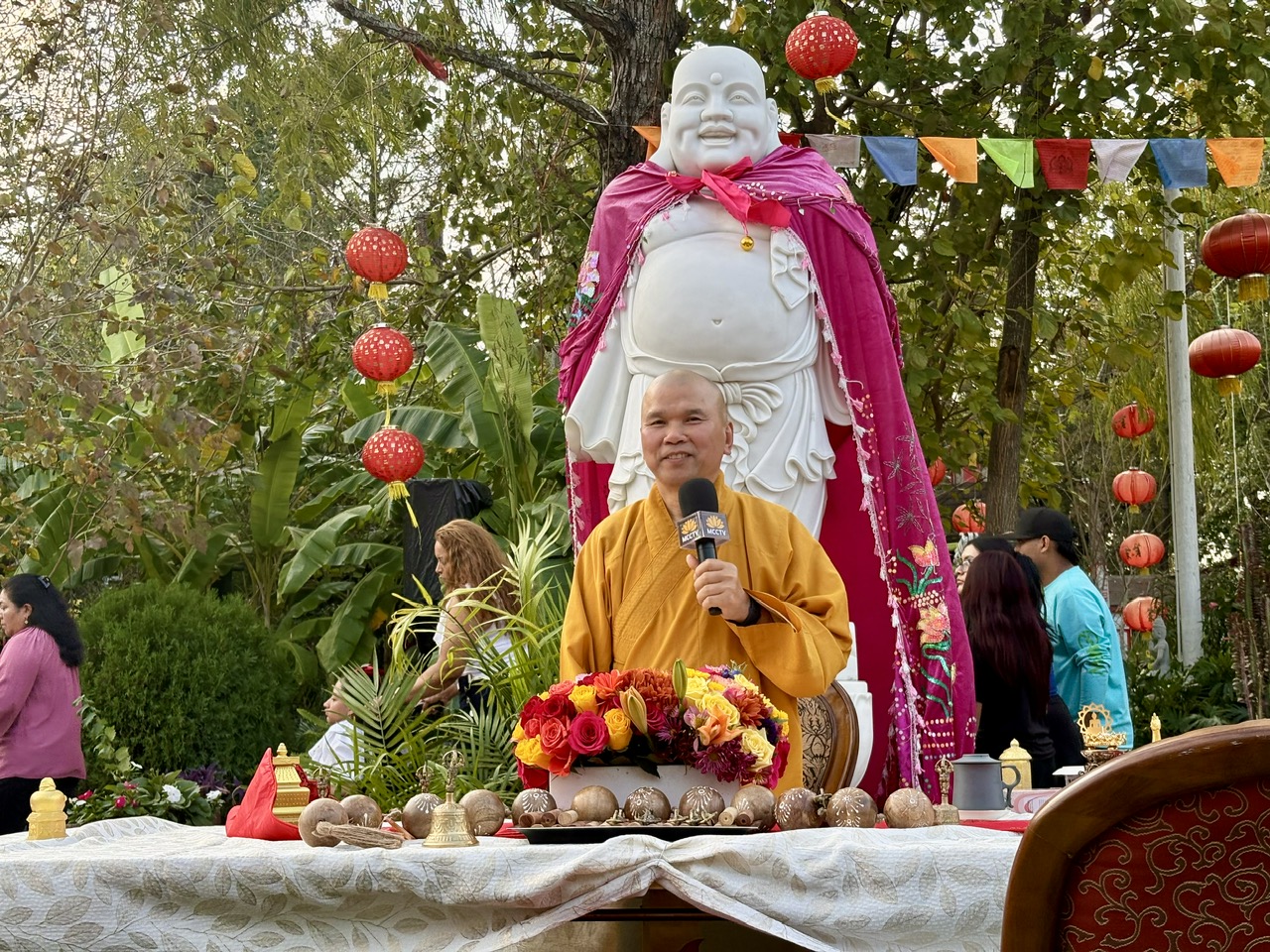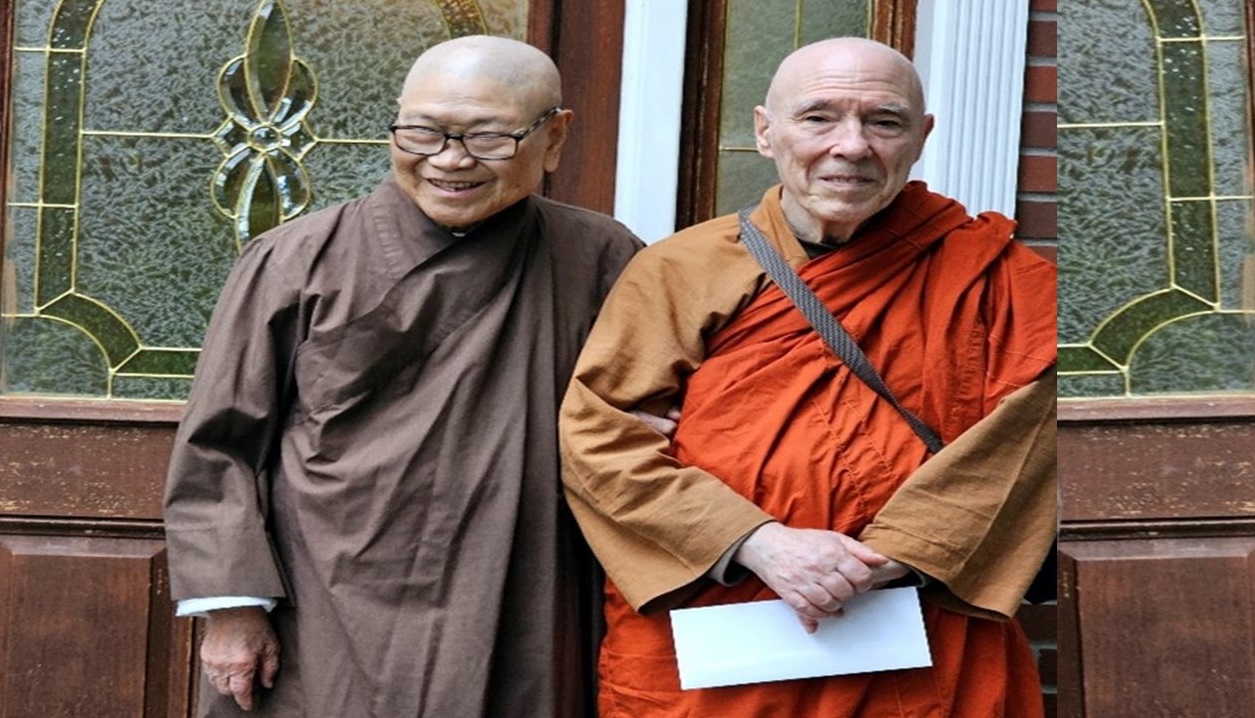
From the left side counting to the right side, the Senior Buddhist Nun Giới Hương, who stands by Master Thích Trừng Sỹ.
The Bhikkhuni Sangha, female monastic Sangha, or daughters of the Sakyamuni lineage, are one of the great disciples of the Sakyamuni Buddha. They have the ability to study the Dharma, understand the Dharma, practice the Dharma, propagate the Dharma, protect the Dharma, obtain the Dharma, and apply the Dharma to their daily lives to bring peaceful joy and happiness to themselves and to other people right here and right now in the present life. With the above theme, “Giới Hương, the Senior Buddhist Nun in the Modern Time,” is a topic discussed in this article.
“Giới Hương” is a compound phrase of Chinese and Vietnamese; “Giới” means the precepts or ethics. “Hương” means fragrance. So “Giới Hương” means the fragrance of the person who learns, understands, and practices the Buddha’s precepts. Here, “Giới Hương” is the Dharma title of the Senior Nun, the Abbess of Huong Sen Buddhist Temple[1] in Southern California, USA. Indeed, when reading the phrase “Giới Hương,” we immediately think about a virtuous flower of beautiful and fragrant color. When hearing and seeing that flower, we feel happy and think of the beautiful image of the monastic person. One of the nature poems, the author Thích Trừng Sỹ wrote:
“Vow to practice the virtues of FLOWERS
Pervading the fragrance of moral virtue
Skillfully saying loving speech
Granting it for every family.”[2]
Thus, the flower mentioned in the above poem is symbolized for a talented and virtuous person, or for a lay and monastic practitioner. In this article, it is shown to the Senior Nun, whose Dharma title is Giới Hương, one of the female monastic persons in modern time. Since she was fortunate enough to become the Buddhist Nun, she has encountered many different adversities in her life, but thanks to the ingenuity of learning, understanding, practicing, applying the Dharma, using the loving speech, she has not only overcome adversities smoothly, but also built good fraternity, dharma friends, fellow monastics, such as cultivation, studies, the establishment of the Temple, the upbringing of nuns, etc.
“Sandalwood or lavender,
lotus or the jasmine great,
of these many fragrances
virtue’s fragrance is supreme.”
(Dharmapada, Verse 55)
“The fragrance of flowers drifts with the wind
as sandalwood, jasmine of lavender.
The fragrance of the virtuous sweeps the wind,
all pervasive is virtue of the good.”
(Dharmapada, Verse 54)
The physical flower blooms, fades, has no birth and no death. Its scent only flies in the direction of the wind, it cannot fly against the wind, but the virtuous flower has never had birth and death, it is originated from the cultivated practitioner who practices the Dharma, understands the Dharma, supports the Dharma, and applies the Buddhadharma in the daily life to benefit many people. This practitioner is shown to the “True Person,” the disciple of the Buddha. The Senior Nun Giới Hương, one of the monastic disciples of the Buddha in modern time, has cultivated, studied, taught, experienced schools and classes of Buddhist studies and secular studies, nurtured, matured, and developed beautifully moral and spiritual life. When we understand and practice so, the moral flower of the True Person is not hindered by any wind, it can fly high, fly far, and spread in many different directions. When hearing and knowing this person, people will feel happy and sympathetic.
“As from a mass of flowers
many a garland may be made,
so by one born mortal
should many good deeds be done.”
(Dharmapada, Verse 53)
Relying on a pile of flowers, people can form many corollas. Also, from this physical body, the practitioner can do many good and wholesome deeds to benefit many people. Conversely, if relying on this physical body, those who do the non-good and unwholesome deeds will bring harm to themselves and to other people in the present life. As the sons or daughters of the Buddha, when learning, understanding, applying, and practicing the Noble Eightfold Path, we have the right view, right thought, right speech, right action, right livelihood, right effort, right mindfulness, right concentration so that we can recognize, purify, and transform bad things into good things, wrong things into right things. When understanding and practicing so, we will bring authentic benefits and peace to all living things and living beings all over the planet.
“Just as a bee in a flower
harming neither hue nor scent
gathers nectar, flies away,
so in towns a Wise One fares.”
(Dharmapada, Verse 49)
Indeed, the Buddha’s disciples, whether monks or nuns, rely on the above verse of the Dhammapada, learn and practice the virtues of the bees, finding flowers to suck the pistil or nectar and flying away, but they do not hurt the fragrance of the flowers. Also, the Buddha’s disciples went to villages and hamlets to do the Buddhist activities, donate materials for the construction of a Temple, cast a bell, print scriptures, etc., so they must consider their actions clearly and thoroughly to fit with the Buddhist activities. Do not take advantage of the gullible beliefs of the almsgivers to seek profit for their own sake and do something that is not in accordance with the Dharma, we will lose their faith and be guilty of the Three Jewels. When understanding and practicing so, we can bring so much credibility and confidence to lay people who will uphold and support the Three Jewels durably and effectively.
When learning the Buddhadharma, we know the mind manifests the external sign. The greedy mind manifests the greedy sign. The angry mind manifests the angry sign. The delusive mind manifests the delusive sign, etc. Conversely, the non-greedy mind manifests the non-greedy sign or the sign of almsgiving. The non-angry mind manifests the non-angry sign or the sign of compassion. The non-delusive mind manifests the non-delusive sign or the sign of wisdom and right view, etc. With the mind of non-greed, we can express our charitable minds, such as almsgiving, offerings, the support and protection of the Three Jewels. With the mind of non-anger, we can practice loving speech and listening. With the mind of non-delusion, we can practice right view and right thought very firmly in life. As practitioners, disciples of the Buddha, we can recognize and select the right and the wrong, the good and the bad. The right and the good will be maintained and developed. The wrong and the bad will be well selected, recognized, and transformed. When understanding and practicing so, we can bring a lot of flowers and fruits of peaceful joy and happiness to many people.
Through the above mentioned things, the person who has the fragrance of precepts, the fragrance of concentration, that of wisdom, liberation, and liberation with right view is the person who has experienced the process of cultivating, studying, propagating the Dharma, protecting the Dharma, practicing the Dharma, and applying the Dharma into her daily, weekly, monthly, and yearly life. With the theme of this article, “Giới Hương, the Senior Buddhist Nun in the Modern Time,” is both her Dharma title and the practitioner who cultivates, studies, practices, and applies the Buddhadharma into her daily life to bring benefits for herself and for other people right now and right here in the present life. Indeed, the Senior Nun, Vietnamese monastic lady, one of the daughters of the Sakyan lineage, has succeeded in many fields of education, learning, teaching, writing, translation, and especially building good fraternity, Dharma friends, and fellow monastics.
By Thích Trừng Sỹ
[1] Huong Sen Buddhist Temple, 19865 Seaton Avenue, Perris, CA 92570, USA. Tel: 951-657-7272 , Cell: 951-616-8620
[2] http://phapnhan.org/en/nature-lessons-by-rich-images/


